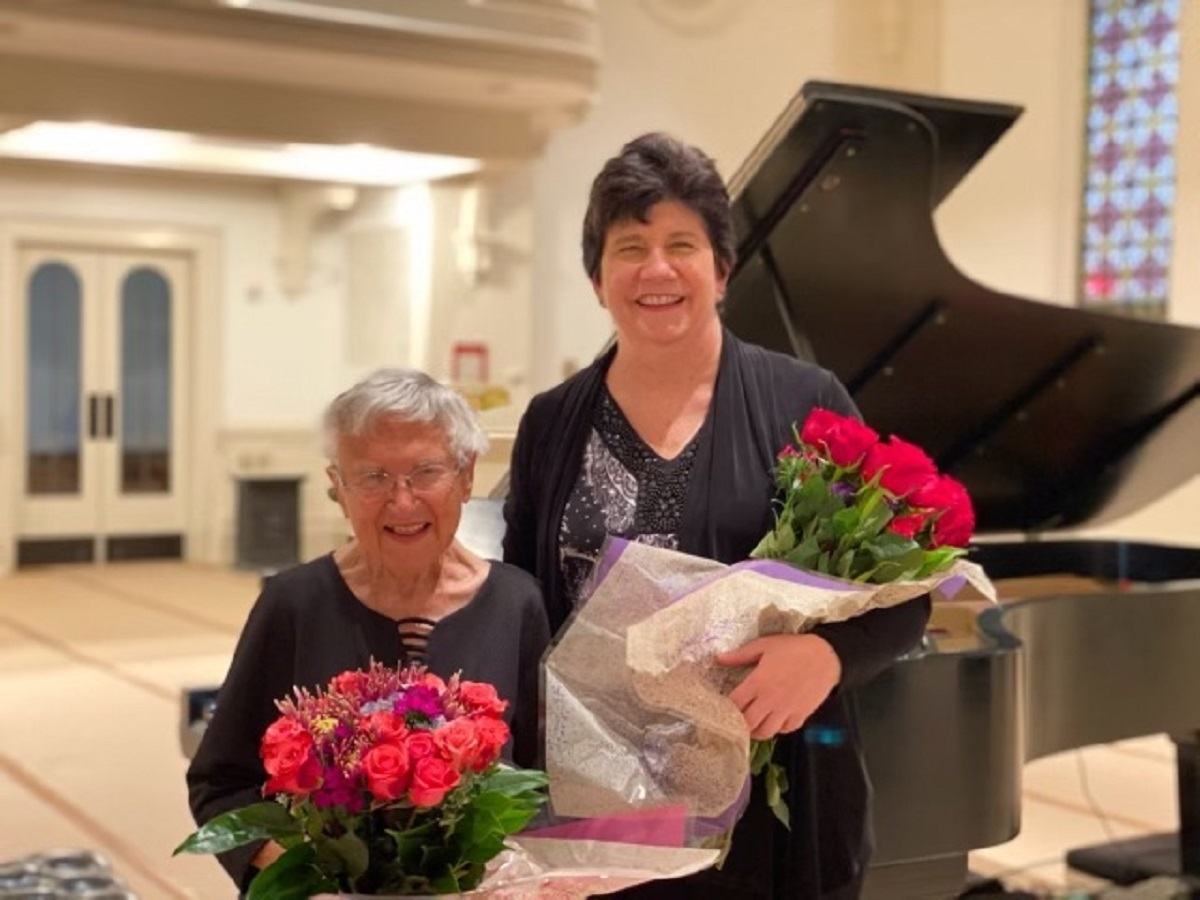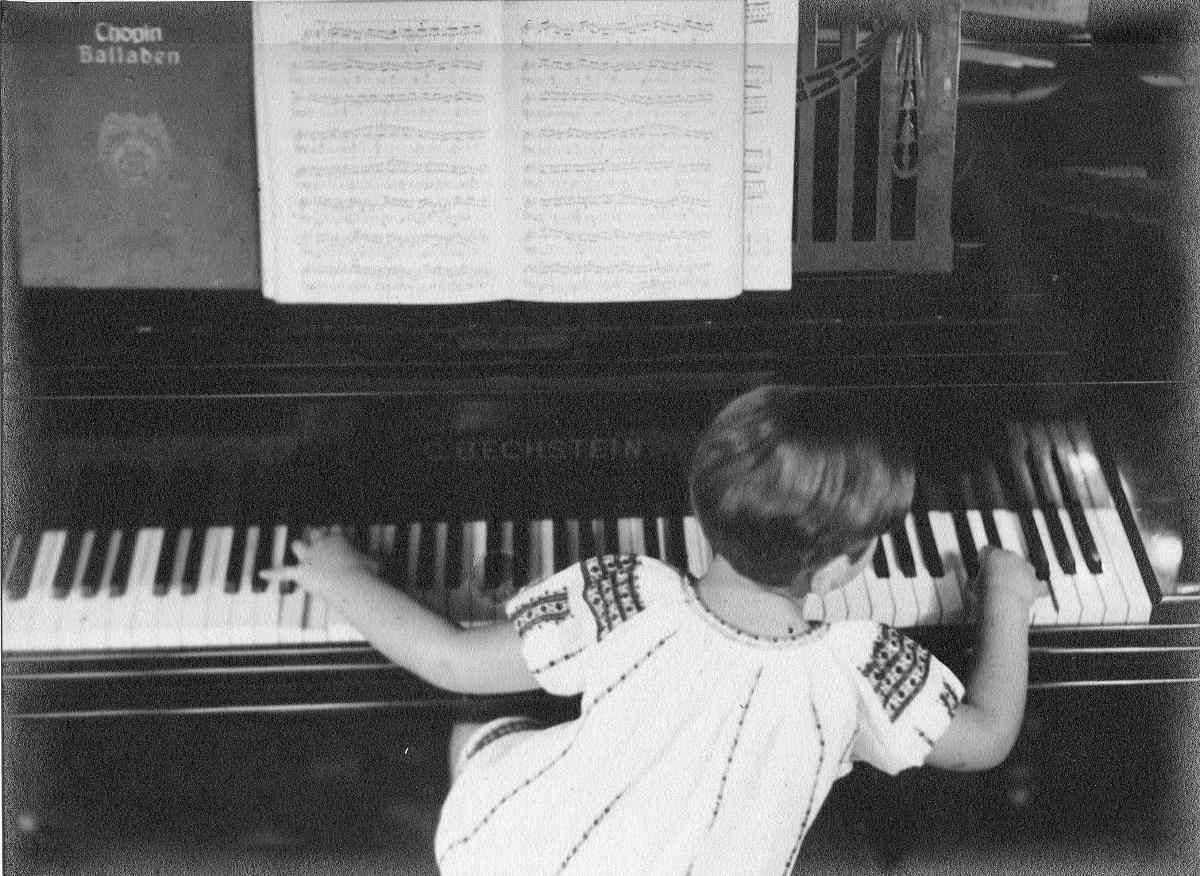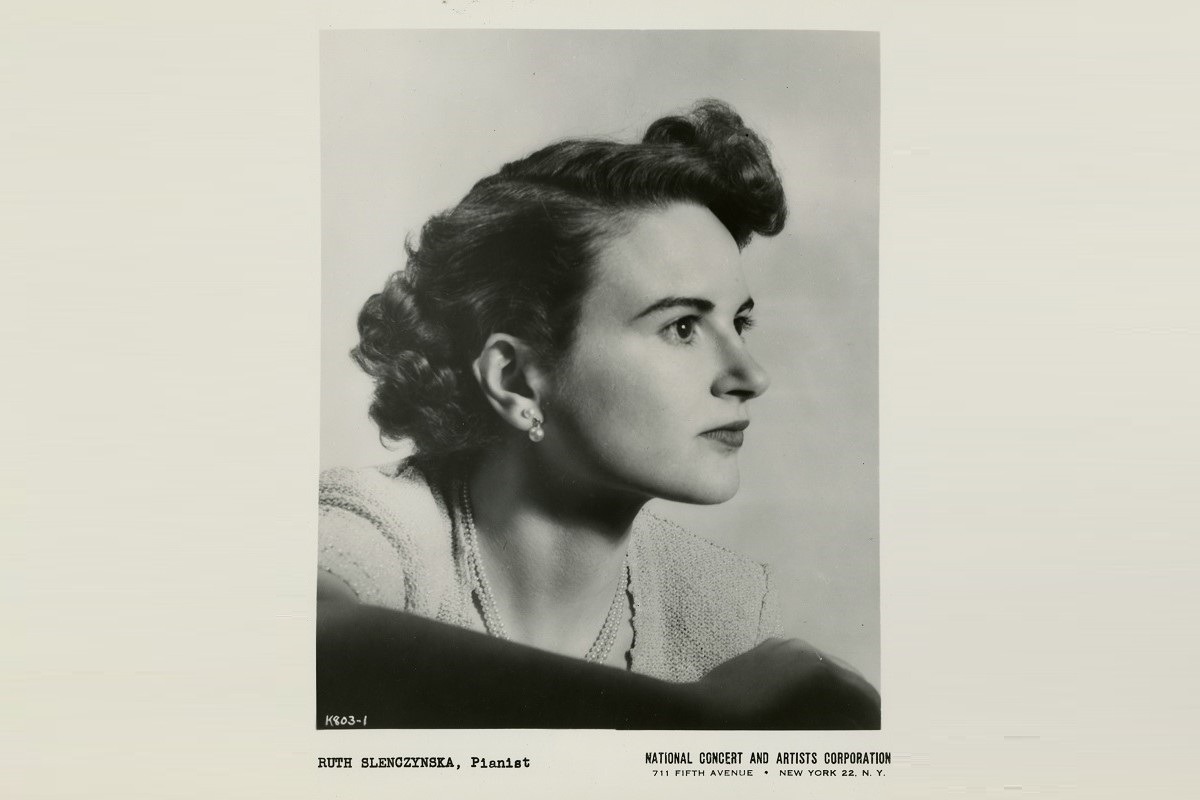
Ruth Slenczynska and Shelly Moorman-Stahlman, right, in 2021 after a duet recital.
16:22 JST, February 4, 2024
Child piano prodigy Ruth Slenczynska received an urgent telegram in 1934: Famed pianist and composer Sergei Rachmaninoff couldn’t play at his performance in Los Angeles because of an elbow injury. Could she fill in?
Slenczynska was 9.
“My father said, ‘Of course, we can come,’” Slenczynska recalled. “When Mr. Rachmaninoff heard his place was taken by a 9-year-old girl, I don’t think he was terribly pleased.”
She soon learned she was mistaken. Rachmaninoff, who was in the prime of his enormous career, was so impressed with her that he offered to teach Slenczynska at his apartment in Paris. Nine decades later, she is believed to be his only living student.
As she approached her 99th birthday last month, Slenczynska thought hard about those lessons with Rachmaninoff, as well as her own remarkable career, which started when she was 4 and her legs were too small to reach the piano pedals, so they were raised for her.
After almost 95 years in front of the keys, she decided it was time to retire.
“I’m a very old lady,” Slenczynska said. “I decided that you don’t need to do as much when you’re going to be 99.”
Her final project was an important one to her, and a fitting coda to her musical career.
In 2022, at age 97, she recorded her first album in nearly 60 years for Decca Classics, a classical music record label.
“My Life in Music,” an album featuring Slenczynska playing pieces from Barber, Bach and her favorite childhood teacher, Rachmaninoff, bookended a lifetime of seeking comfort through music, she said. Her childhood was punishing.
“During bad times, it was music that got me through,” said Slenczynska, now living with one of her former piano students near Hershey, Penn. “When I was a child, music was always my escape.”
Now retired, Slenczynska said she is content to enjoy the quiet as she reflects upon almost a century of performing. The Classic FM radio website featured her story on her 99th birthday last month.
Slenczynska was born in Sacramento, but her family moved to Australia to be near her father’s brother when she was nine months old. She said she was 1½ when she first sat at a piano bench with her father, Joseph Slenczynski, a Polish immigrant and violinist.
“My father started showing me the notes on the piano when my mother was in the hospital having her second baby,” Slenczynska said. “He was restless and didn’t have anything else to do, so he gave me a little lesson.”
By age 3, her father had implemented a rigorous practice routine. Slenczynska recalled him being domineering and abusive.
“He wanted more than he could get out of everybody, including me,” she said. “What would you call a person who beat you for every little mistake you made? It was miserable.”
As she grew up, Slenczynska said her father forced her to practice the piano for nine hours a day while her two younger sisters played outside. Her family had moved to Paris when she was 4 so she would have access to the best teachers as she progressed in her piano studies.
“I wanted to join [my sisters], but if I didn’t want to practice, I was chased around with a stick,” she said. “But I found comfort and beauty in the music. It was a way to get away from [my father.] I could think about how beautiful the music was, and I didn’t feel so bad.”
Slenczynska’s difficult early years were chronicled in her 1957 memoir, “Forbidden Childhood.”
She was 6 when she performed in concert in Berlin in 1931, and she was 7 when she performed with a full orchestra in Paris. Programs billed her as one of the greatest child prodigies since Mozart.
“Was I scared to perform? Of course,” she said. “I still am. But it is something you become accustomed to. I would just become absorbed in the music.”

Ruth Slenczynska performs Chopin in 1931 at age 6.
She soon became the moneymaker for her family, she said, with concert tours filling her schedule and a private tutor to keep her caught up with schoolwork in Paris.
After she’d substituted for Rachmaninoff in Los Angeles when she was 9, she and her father returned home and received an invitation to visit Rachmaninoff at the residential hotel in Paris where he practiced during the week, she said.
“He lived in Switzerland, but his wife wasn’t thrilled to hear him practicing 17 hours a day,” Slenczynska said. “So he would come to Paris to practice Monday through Friday.”
She found out she was to play for Rachmaninoff one day when her father interrupted her practice to tell her she’d be playing for the legendary pianist the following week. She recalled it being a Wednesday.
“I was as scared as I could be,” she said. “I said, ‘I can’t play for him,’ but my father said, ‘Well, you’re going to,’ and we went the next week to see him.”
As they approached Rachmaninoff’s apartment in Paris, Slenczynska said she heard someone practicing the piano very slowly and thought, ‘My goodness, this student isn’t very good.’”
“Then we rang the bell and the music suddenly stopped and I realized it was him,” she said. “This very tall man opened the door and looked down at me. He pointed at me with his long finger and said, ‘that plays the piano?’”
She said she couldn’t stop shaking as he summoned her and her father inside.
“He wanted me to stop shaking, so he pulled a little paper from his pocket and drew me a picture of his boat,” Slenczynska recalled. “I started to laugh, picturing myself on this boat, and he then knew it was okay for me to play.”
Rachmaninoff knew what it was like to be a child prodigy – his aristocratic mother had given him his first piano lesson at age 4. His famous Piano Concerto No. 2 was written when he was in his 20s.
At his apartment that day, Rachmaninoff asked Slenczynska to play one of her favorite pieces for him in a different key.
“The piece was in E-flat major, and he asked me to play it in G-major,” she said. “That meant I had to transpose. So very slowly, I did that. He then asked if I’d played any of his music, and I told him no. I had thought he wrote only big concertos.”
Rachmaninoff pulled out a pen and wrote “Prelude in D Major, Op. 23, No. 4,” on a piece of paper and handed it to her, she said.
“He said, ‘Buy this music and play it for me next Wednesday,’” she said. “That’s how I got my first lesson.”
For the next two summers, she was Rachmaninoff’s student, and she enjoyed tea and Russian cakes served by his niece after her lessons, Slenczynska said. Her famous teacher gave her a Fabergé egg necklace, which she still wears in his honor.
Slenczynska said Rachmaninoff taught her to think about how music related to the composer, and the importance of adding history and emotion to each piece.
“He was more than a teacher – he was a kind person, like a grandfather,” she said.
The great piano maestro, who died in 1943, mentored and taught just a few students in his life, including Gina Bachauer, who died in 1976.
“I am now his only living student,” Slenczynska said of Rachmaninoff. “That is something I never expected, but then, life never turns out the way you expect it to.”
When Slenczynska was 15, she said she fled her father’s abuse and set out on her own. She stopped performing and studied music at the University of California, and in 1944 she met and married another student there, she said. They eventually divorced.
In 1954, Slenczynska resumed her concert career and accepted an artist-in-residence position at Southern Illinois University Edwardsville, where she taught piano until 1987.
She has performed for five U.S. presidents, including Ronald Reagan, Jimmy Carter, John F. Kennedy, Herbert Hoover and Harry S. Truman, who was an amateur pianist, she said.
“President Truman called me to the White House and asked me to play a duet with him,” she recalled. “I really should have gotten a picture.”

A talent agency photo of Ruth Slenczynska from the 1950s.
While teaching in Illinois, Slenczynska married James Kerr, a professor of political science, in 1967. “He was the love of my life,” she said.
After Kerr’s death in 2001, Slenczynska moved to New York City to teach students and judge piano competitions, she said. She remained there until August 2020 during the pandemic, when one of her former students – Pennsylvania pianist and music professor Shelly Moorman-Stahlman – persuaded Slenczynska to move in with her and her husband.
“The pandemic was not a good time for elderly people to be out, and we live in a small community where she could safely continue her walks,” Moorman-Stahlman said, adding that Slenczynska doesn’t have children.
“Ruth is a remarkable woman – she has a unique ability to always be looking forward,” she added. “We have a lot of fun together, and she is still incredibly alert and gets around very well. She still insists on taking the stairs.”
Although she has retired from performing, Slenczynska said she enjoys listening to others play the piano and she will occasionally offer advice to promising students.
“I’m a very fortunate lady, and my hands are as youthful and free of pain as when I was 30,” she said. “It’s because of the music. It will always be an important part of who I am.”
Top Articles in News Services
-

Survey Shows False Election Info Perceived as True
-

Hong Kong Ex-Publisher Jimmy Lai’s Sentence Raises International Outcry as China Defends It
-

Japan’s Nikkei Stock Average Touches 58,000 as Yen, Jgbs Rally on Election Fallout (UPDATE 1)
-

Japan’s Nikkei Stock Average Falls as US-Iran Tensions Unsettle Investors (UPDATE 1)
-

Trump Names Former Federal Reserve Governor Warsh as the Next Fed Chair, Replacing Powell
JN ACCESS RANKING
-

Producer Behind Pop Group XG Arrested for Cocaine Possession
-

Japan PM Takaichi’s Cabinet Resigns en Masse
-

Man Infected with Measles Reportedly Dined at Restaurant in Tokyo Station
-

Israeli Ambassador to Japan Speaks about Japan’s Role in the Reconstruction of Gaza
-

Videos Plagiarized, Reposted with False Subtitles Claiming ‘Ryukyu Belongs to China’; Anti-China False Information Also Posted in Japan























